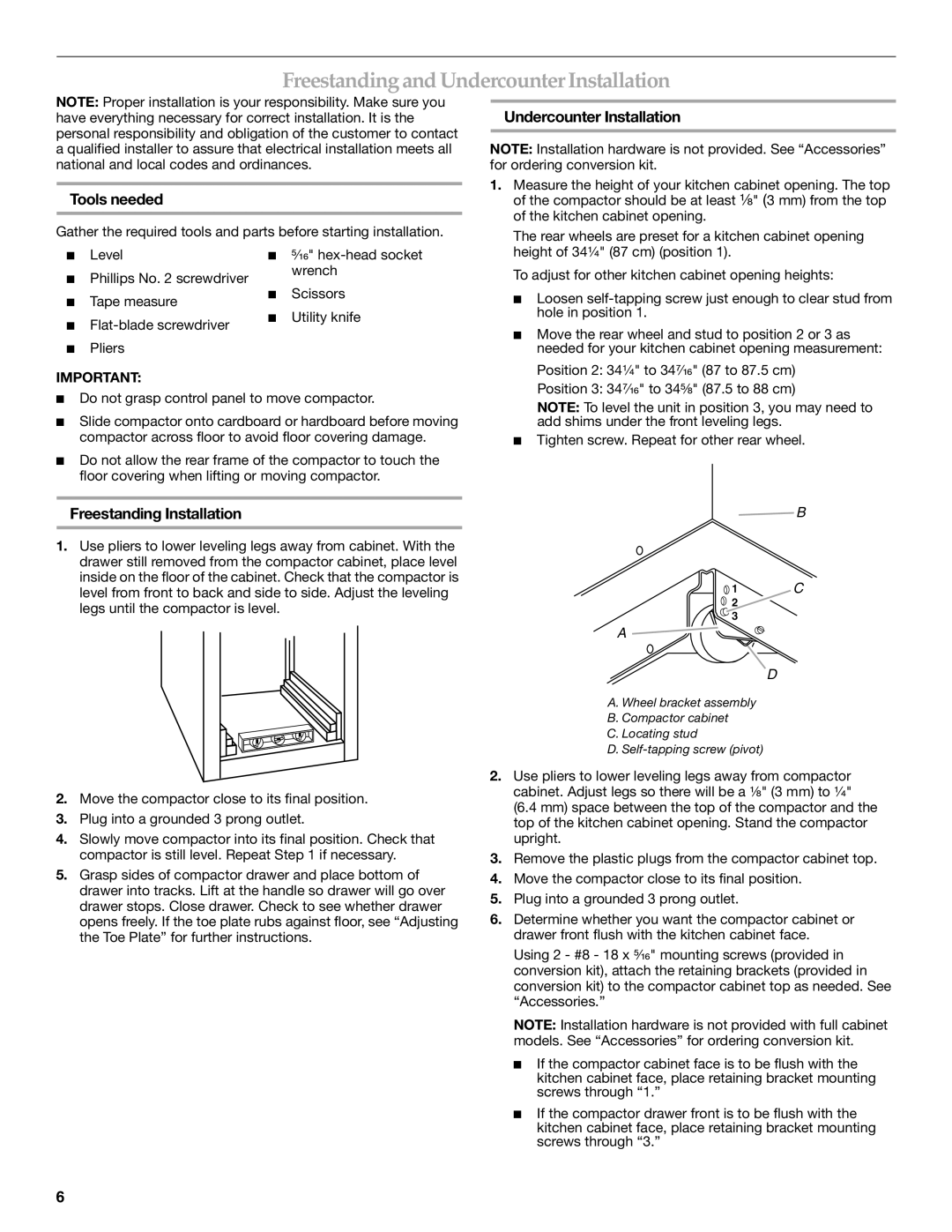
Freestanding and Undercounter Installation
NOTE: Proper installation is your responsibility. Make sure you have everything necessary for correct installation. It is the personal responsibility and obligation of the customer to contact a qualified installer to assure that electrical installation meets all national and local codes and ordinances.
Tools needed
Gather the required tools and parts before starting installation.
■ | Level | ■ | ⁵⁄₁₆" |
■ Phillips No. 2 screwdriver |
| wrench | |
| Scissors | ||
■ | Tape measure | ■ | |
| Utility knife | ||
■ | ■ | ||
|
| ||
■ | Pliers |
|
|
IMPORTANT:
■Do not grasp control panel to move compactor.
■Slide compactor onto cardboard or hardboard before moving compactor across floor to avoid floor covering damage.
■Do not allow the rear frame of the compactor to touch the floor covering when lifting or moving compactor.
Freestanding Installation
1.Use pliers to lower leveling legs away from cabinet. With the drawer still removed from the compactor cabinet, place level inside on the floor of the cabinet. Check that the compactor is level from front to back and side to side. Adjust the leveling legs until the compactor is level.
2.Move the compactor close to its final position.
3.Plug into a grounded 3 prong outlet.
4.Slowly move compactor into its final position. Check that compactor is still level. Repeat Step 1 if necessary.
5.Grasp sides of compactor drawer and place bottom of drawer into tracks. Lift at the handle so drawer will go over drawer stops. Close drawer. Check to see whether drawer opens freely. If the toe plate rubs against floor, see “Adjusting the Toe Plate” for further instructions.
Undercounter Installation
NOTE: Installation hardware is not provided. See “Accessories” for ordering conversion kit.
1.Measure the height of your kitchen cabinet opening. The top of the compactor should be at least ¹ " (3 mm) from the top of the kitchen cabinet opening.
The rear wheels are preset for a kitchen cabinet opening height of 34¹⁄₄" (87 cm) (position 1).
To adjust for other kitchen cabinet opening heights:
■Loosen
■Move the rear wheel and stud to position 2 or 3 as needed for your kitchen cabinet opening measurement:
Position 2: 34¹⁄₄" to 34⁷⁄₁₆" (87 to 87.5 cm)
Position 3: 34⁷⁄₁₆" to 34⁵⁄₈" (87.5 to 88 cm)
NOTE: To level the unit in position 3, you may need to add shims under the front leveling legs.
■Tighten screw. Repeat for other rear wheel.
![]() B
B
1C
2
3
A ![]()
D
A. Wheel bracket assembly
B. Compactor cabinet
C. Locating stud
D.
2.Use pliers to lower leveling legs away from compactor cabinet. Adjust legs so there will be a ¹⁄₈" (3 mm) to ¹₄ "
(6.4 mm) space between the top of the compactor and the top of the kitchen cabinet opening. Stand the compactor upright.
3.Remove the plastic plugs from the compactor cabinet top.
4.Move the compactor close to its final position.
5.Plug into a grounded 3 prong outlet.
6.Determine whether you want the compactor cabinet or drawer front flush with the kitchen cabinet face.
Using 2 - #8 - 18 x ⁵₁₆ " mounting screws (provided in conversion kit), attach the retaining brackets (provided in conversion kit) to the compactor cabinet top as needed. See “Accessories.”
NOTE: Installation hardware is not provided with full cabinet models. See “Accessories” for ordering conversion kit.
■If the compactor cabinet face is to be flush with the kitchen cabinet face, place retaining bracket mounting screws through “1.”
■If the compactor drawer front is to be flush with the kitchen cabinet face, place retaining bracket mounting screws through “3.”
6
